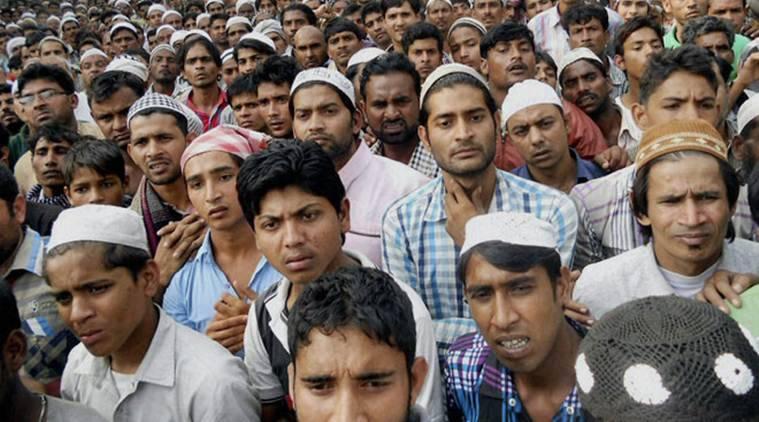Global Fallout of Islamophobia and Sectarianism

Representational image. Image Courtesy: The Indian Express
In recent times, there have been many acts of violence triggered by offensive posts about Prophet Mohammad or the burning of the Koran. One such incident took place on 11 August in Bangalore, Karnataka. A nephew of a Congress MLA, Navin Kumar, posted a derogatory post on Facebook. Following this, a Muslim community leader accompanied by many others attempted to register an FIR, but found the police were reluctant to do so. A crowd turned violent soon after, burning and damaging property, and the police opened fire, in which three died.
In Sweden, in late August, the leader of a far-right outfit burned a copy of the Koran, the holy book of Muslims, in Malmo city. This provocative act was committed near a predominantly Muslim migrant neighbourhood. The neo-Nazi party “Sweden democrats” is the third-largest party in the Swiss Parliament. The party foregrounds national identity and attributes the problems of Sweden to refugees. Nearly 300 people protested against the Koran-burning and created mayhem. The right-wing parties claim that Nordic countries are being Islamised, and that the crime graph is going north due to immigration of Muslims, many due to the war in Syria, into Sweden.
Right-wing populist parties are on the upswing in many European countries. One of them is the AfG or Alternative for Germany. Most of these parties are formed on neo-fascist principles of ultra-nationalism and their politics includes the targeting of immigrants. The irony, or tragedy, is that the immigrants they wish to target are themselves a creation of wars unleashed in West Asia by the rise of Islamist politics. A further irony is that the roots of these wars go into the formation of the Al Qaeda, ISIS and other similar organisations, which owe their existence in large part to the foreign policy of the United States. This is something that few acknowledge, but it is a fact. The United States’ policies have promoted Islamist ideologies in many parts of the world which have became the trouble-spots of the last few decades. Soon after American interventions, which are primarily centred round its “oil hunger”, there have been severe consequences on the local populations West Asia and a cascading negative effect all over the world.
Who can forget Charlie Hebdo, the French satirical magazine, which has reprinted the controversial cartoons of Prophet Mohammad just this month, as the trial against the terrorists who had attacked its office in 2015 begins. The magazine’s office was attacked in the wake of the publication of these cartoons, which many found offensive. Several magazine staffers were killed in the attack. The accused were arrested and their trial has just begun.
In 2007, in France again, massive violence was sparked after two Muslim immigrant youths were killed by police who were investigating the murder of a white man. These youth were in hiding for they lacked proper immigration and residency papers. Their death sparked off a series of violent incidents. Most people who are clubbed as “immigrants” today belong to nations that were once the colonies of France—for example, Morocco, Tunisia, Mali, Senegal and Algeria. It is these countries from where a large section had migrated to France in the fifties and sixties. They are mostly Muslims and Blacks. They live in abysmal conditions in the suburbs of Paris and other parts of France.
The horrific Boko Haram kidnappings, the killing of children in Peshawar by the Taliban, all of these incidents are fresh in our recollection of this period of history. As we witness in India, where Muslims are repeatedly accused of having large families that lead to backwardness, there is also a trend among right-wing leaders in Europe to blame Muslims for somehow or the other refusing to conform to local norms. Some of the right-wing extremist leaders look down on this section of population with feelings of extreme hate and scorn.
We are living in strange times, when religious identities are rearing their head all around. The victims of this are mostly Muslims. In India while this is a carry-over from the Partition and its aftermath, when the elite Muslims had left for Pakistan and large sections of the Muslims who stayed behind were the poor and marginalised. The social-economic conditions of Muslims have worsened due to policy neglect, social bias, administrative failures and political indifference towards their real conditions, and now also due to the regular and repetitive acts of violence against them. This has led to the horrific ghettoisation of India’s biggest minority.
In Europe, Islamophobia picked up due to a variety of factors. The wars in West Asia, which made a large number of families refugees, were a big factor. Some countries, like Sweden, have offered refuge to war-struck immigrants, but it is predominantly states outside Europe that have taken the lead in accepting refugees. Due to low educational levels, many refugees have remained unemployed in their new host countries. They have to subsist on social security, and this becomes the biggest weapon for the neo-Nazi right-wing forces to to target them with.
The factor which is common all around is the United States’ imperialist foreign policy, which promoted a politics that has shaped the destiny of major parts of the world. The training of Al Qaeda in madrasas in Pakistan was a major turning point, which sowed the seeds of violence in the oil-rich zones of the world. America played a major role in supporting this training of radical Islamists and the promotion of their brand of Islam. After 9/11, the American media unleashed itself against Muslims by coining the phrase, “Islamic terrorism”. The global media picked it up. So in countries like India, where communalism has been the outcome of British Policy of “divide and rule”, got a further boost from United States’ policies in the 21st century.
While many a Muslim country has been trying to come to terms with the modern idea of a secular state, the countries in oil zone are more in the grips of fundamentalism. Turkey, though many fear that it is receding into the grip of fundamentalism again, was among the first countries to have upheld secularism as early as in the 1920s. In 2019, Sudan decided to delink the state from religion and guarantee freedom of conscience as well as omit the reference to Sharia, or Islamic legal canon, as the source of law. Countries with large Muslim populations, such as Indonesia and Malaysia, are also far from the fundamentalism one sees in the Islamic West Asian countries.
The backwardness among sections of Muslim community, in India, West Asia or some European countries is not due to Islam in any way. It is a complex political process in which Islam has been picked up as a ruse by the dominant global power for its imperialist goals of which are economic first and last. The section of Muslim population giving primacy to religious identity has also to be seen as the sigh of a besieged community who are victims of these political processes.
The author is a social activist and commentator. The views are personal.
Get the latest reports & analysis with people's perspective on Protests, movements & deep analytical videos, discussions of the current affairs in your Telegram app. Subscribe to NewsClick's Telegram channel & get Real-Time updates on stories, as they get published on our website.
























